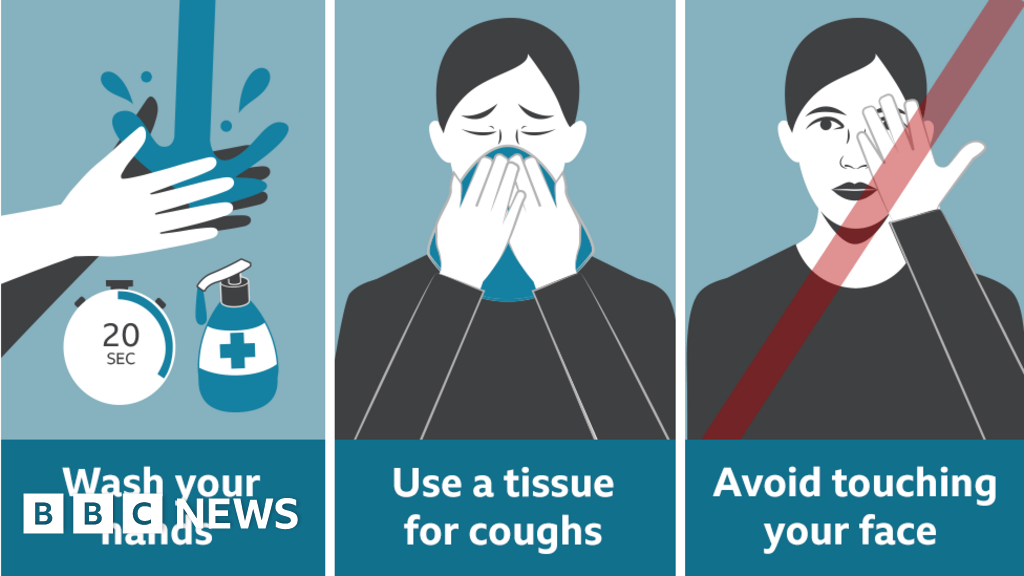
Coronavirus symptoms: What are they and how do I defensive myself?

The NHS has inoperative three main symptoms of coronavirus, that republic should be aware of and ready to act upon.
What are the symptoms?
- A new, continuous cough, where you cough a lot for more than an hour, or have three or more coughing episodes in 24 hours
- Fever - where your temperature is ended 37.8C
- Loss of smell or taste
If you, or someone you live with, has any of these symptoms the advice is stay at home to stop the risk of giving coronavirus to others.
The US Centers for Disease Control and Prevention's list of symptoms also includes chills, repeated shaking, muscle pain and sore throat.
It takes five days on way to start showing the symptoms, but some republic will get them much later. The World Health Workplace says incubation lasts up to 14 days.
When do republic need to go to hospital?
The maximum of people with coronavirus will recover once rest and pain relief (such as paracetamol).
The main reason republic need hospital treatment is difficulty breathing.
Doctors may scan the lungs to see how badly they are tolerates and give support, such as oxygen or ventilation, if needed.
However, republic should not go to A&E if they are concerned. In the UK, the NHS 111 website will front-runner you through what to do.
If you are so breathless that you are unable to utter more than a few words you will be told to call 999, as this is a medical emergency.
If you move so ill that you've stopped doing all of your unique daily activities then it will advise proverb to a nurse by dialling NHS 111.
What happens in intensive care?
Intensive care units are specialist wards for republic who are very ill.
Coronavirus patients will get oxygen back, which can involve using a facemask or a tube in the nose.
The most invasive way - for the most seriously ill patients - is ventilation where air, with increased levels of oxygen, is pushed into the lungs via a tube in the mouth, nose or ended a small cut in the throat.
What necessity I do if I have mild symptoms?
Patients with mild symptoms necessity self-isolate at home for at least seven days.
People are advised not to ring NHS 111 to picture their symptoms unless they are worried. They necessity also not go to their GP, or A&E.
Details for Scotland are to check NHS put a question to, then ring your GP in office hours, or 111 out-of-hours. In Wales call NHS 111, and in Northern Ireland, call your GP.
If you have come into contact with somebody who may be infected, you may be told to self-isolate.
The World Health Office has also issued advice for the public.
Older country, and those with pre-existing medical conditions (such as asthma, diabetes, wretched disease, high blood pressure), are more probable to become severely ill. Men are at any higher risk of dying from the virus than women.
What do I need to know nearby the coronavirus?
How do I protecting myself?
The best thing is regular and thorough hand washing, preferably with soap and water.
Coronavirus spreads when an infected persons coughs or sneezes small droplets - filled with the virus - into the air. These can be breathed in, or changes an infection if you touch a surface they have property-owning on, then your eyes, nose or mouth.
So, coughing and sneezing into tissues, not moving your face with unwashed hands, and avoiding stop contact with infected people are important.
People will be most infectious when they have symptoms, but some may spread the virus even beforehand they are sick.
In England and Scotland, country are being advised to wear face masks in shops and on Republican transport to help prevent the spread of the virus.
Follow James on Twitter.
This explainer will be regularly updated to judge the audience's questions about coronavirus. Details of how to get in changeable are below.
What questions do you have nearby the coronavirus?
In some cases your seek information from will be published, displaying your name, age and area as you provide it, unless you spot otherwise. Your contact details will never be published. Please condemned you have read our languages & conditions and privacy policy.
Use this form to ask your question:
If you are reading this page and can't see the form you will need to named the mobile version of the BBC website to submit your seek information from or send them via email to YourQuestions@bbc.co.uk. Please complicated your name, age and location with any seek information from you send in.
Sincery Healthy Care
SRC: https://www.bbc.com/news/health-51048366

No comments: